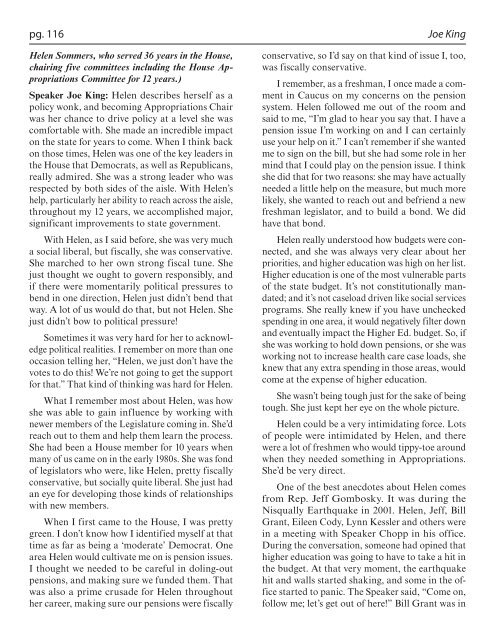Helen Sommers: An Oral History
Helen Sommers: An Oral History
Helen Sommers: An Oral History
You also want an ePaper? Increase the reach of your titles
YUMPU automatically turns print PDFs into web optimized ePapers that Google loves.
pg. 116 Joe King<br />
<strong>Helen</strong> <strong>Sommers</strong>, who served 36 years in the House,<br />
chairing five committees including the House Appropriations<br />
committee for 12 years.)<br />
Speaker Joe King: <strong>Helen</strong> describes herself as a<br />
policy wonk, and becoming Appropriations Chair<br />
was her chance to drive policy at a level she was<br />
comfortable with. She made an incredible impact<br />
on the state for years to come. When I think back<br />
on those times, <strong>Helen</strong> was one of the key leaders in<br />
the House that Democrats, as well as Republicans,<br />
really admired. She was a strong leader who was<br />
respected by both sides of the aisle. With <strong>Helen</strong>’s<br />
help, particularly her ability to reach across the aisle,<br />
throughout my 12 years, we accomplished major,<br />
significant improvements to state government.<br />
With <strong>Helen</strong>, as I said before, she was very much<br />
a social liberal, but fiscally, she was conservative.<br />
She marched to her own strong fiscal tune. She<br />
just thought we ought to govern responsibly, and<br />
if there were momentarily political pressures to<br />
bend in one direction, <strong>Helen</strong> just didn’t bend that<br />
way. A lot of us would do that, but not <strong>Helen</strong>. She<br />
just didn’t bow to political pressure!<br />
Sometimes it was very hard for her to acknowledge<br />
political realities. I remember on more than one<br />
occasion telling her, “<strong>Helen</strong>, we just don’t have the<br />
votes to do this! We’re not going to get the support<br />
for that.” That kind of thinking was hard for <strong>Helen</strong>.<br />
What I remember most about <strong>Helen</strong>, was how<br />
she was able to gain influence by working with<br />
newer members of the Legislature coming in. She’d<br />
reach out to them and help them learn the process.<br />
She had been a House member for 10 years when<br />
many of us came on in the early 1980s. She was fond<br />
of legislators who were, like <strong>Helen</strong>, pretty fiscally<br />
conservative, but socially quite liberal. She just had<br />
an eye for developing those kinds of relationships<br />
with new members.<br />
When I first came to the House, I was pretty<br />
green. I don’t know how I identified myself at that<br />
time as far as being a ‘moderate’ Democrat. One<br />
area <strong>Helen</strong> would cultivate me on is pension issues.<br />
I thought we needed to be careful in doling-out<br />
pensions, and making sure we funded them. That<br />
was also a prime crusade for <strong>Helen</strong> throughout<br />
her career, making sure our pensions were fiscally<br />
conservative, so I’d say on that kind of issue I, too,<br />
was fiscally conservative.<br />
I remember, as a freshman, I once made a comment<br />
in Caucus on my concerns on the pension<br />
system. <strong>Helen</strong> followed me out of the room and<br />
said to me, “I’m glad to hear you say that. I have a<br />
pension issue I’m working on and I can certainly<br />
use your help on it.” I can’t remember if she wanted<br />
me to sign on the bill, but she had some role in her<br />
mind that I could play on the pension issue. I think<br />
she did that for two reasons: she may have actually<br />
needed a little help on the measure, but much more<br />
likely, she wanted to reach out and befriend a new<br />
freshman legislator, and to build a bond. We did<br />
have that bond.<br />
<strong>Helen</strong> really understood how budgets were connected,<br />
and she was always very clear about her<br />
priorities, and higher education was high on her list.<br />
Higher education is one of the most vulnerable parts<br />
of the state budget. It’s not constitutionally mandated;<br />
and it’s not caseload driven like social services<br />
programs. She really knew if you have unchecked<br />
spending in one area, it would negatively filter down<br />
and eventually impact the Higher Ed. budget. So, if<br />
she was working to hold down pensions, or she was<br />
working not to increase health care case loads, she<br />
knew that any extra spending in those areas, would<br />
come at the expense of higher education.<br />
She wasn’t being tough just for the sake of being<br />
tough. She just kept her eye on the whole picture.<br />
<strong>Helen</strong> could be a very intimidating force. Lots<br />
of people were intimidated by <strong>Helen</strong>, and there<br />
were a lot of freshmen who would tippy-toe around<br />
when they needed something in Appropriations.<br />
She’d be very direct.<br />
One of the best anecdotes about <strong>Helen</strong> comes<br />
from Rep. Jeff Gombosky. It was during the<br />
Nisqually Earthquake in 2001. <strong>Helen</strong>, Jeff, Bill<br />
Grant, Eileen Cody, Lynn Kessler and others were<br />
in a meeting with Speaker Chopp in his office.<br />
During the conversation, someone had opined that<br />
higher education was going to have to take a hit in<br />
the budget. At that very moment, the earthquake<br />
hit and walls started shaking, and some in the office<br />
started to panic. The Speaker said, “Come on,<br />
follow me; let’s get out of here!” Bill Grant was in
















